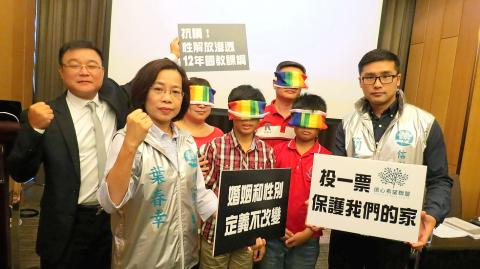When it was announced that Democratic Progressive Party (DPP) Chairperson Tsai Ing-wen (蔡英文) won the presidential election last month, supporters crowded her national campaign headquarters in celebration.
In addition to being elected Taiwan’s first female president, Tsai’s victory is especially significant for the country’s lesbian, gay, bisexual and transgender (LGBT) community. Unlike other candidates and all former presidents, she will be the first Taiwanese president ever to publicly support same-sex marriage.
A NEW PRESIDENT

Photo courtesy of Tsai Ing-wen’s national campaign headquarters
Tsai’s LGBT-friendly position was summed up last month in a headline by news outlet Quartz: “Taiwan’s new president is a female academic who loves cats and supports gay rights.” Before the Taiwan LGBT Pride Parade in Taipei last year, she publicly declared support for marriage equality to boost parade’s visibility and momentum. With her popularity and influence, Tsai should make a positive impact on Taiwan’s gay rights movement.
It would be naive, however, to view Tsai’s victory as a panacea for the LGBT community. In light of the fact that DPP caucus whip Ker Chien-ming (柯建銘), as well as some DPP legislators, has repeatedly blocked a draft bill for marriage equality, it is hardly surprising that the Collective of Sex Workers and Supporters (日日春關懷互助協會) asked: “Does Tsai really speak for the DPP [on the issue]?”
Tsai has also been called “water spinach” ( 空心菜, kongxincai), a hollow-stemmed vegetable, for failing to propose substantial policy ideas (“Tsai” is homophonous with cai, 菜, vegetable). Though the transition of executive power doesn’t take place until May, she has yet to propose any concrete LGBT policies, so the gay community should not soley rely on her support.

photo: Su Ching-feng, Taipei Times
A NEW PARTY
The legislative election was held on the same day as the presidential election. The emergence of the Faith and Hope League (信心希望聯盟, FHL) party reveals how contentious marriage equality remains in Taiwan. Unlike other parties, the FHL ran on a conservative platform that specifically targeted LGBT rights.
The party was established in September of last year for the purpose of building a “Christian political platform.” But the eight legislative candidates it nominated failed to gain any seats, receiving 1.7 percent of the vote — a low figure, but suggests that there is still significance opposition to the idea.
During its campaign, the FHL pledged to protect “traditional family values” by pushing for a referendum against the legalization of same-sex marriage. With the help of Christian teachers, it controversially distributed petitions to elementary and secondary school students, who were told to have their parents sign the forms.
For example, the student bulletin of National Taichung Girls’ Senior High School (台中女中) reported last month that members of the FHL were distributing petitions at the school’s sports games, warning students not to be brainwashed by LGBT people.
“Taiwan is a free and democratic society, and Taiwanese enjoy the freedom of expression and the right to participate in politics through referenda,” the bulletin stated. “But it is outrageous when the right is misused to oppress others,” raising the question of who is being oppressed?
A NEW LEGISLATURE
In another sign that there is still much that needs to be done for LGBT rights, 12 legislators, including Chinese Nationalist Party (KMT) legislator Lu Hsueh-chang (呂學樟), a former Judiciary Committee convener who said that homosexuals are “scary” and that legalizing same-sex marriage is encouraging “bestiality,” stood for the election. Although they failed to be nominated or reelected, they are still on the political scene.
However, today close to 40 of Taiwan’s 113 legislators support same-sex marriage — a new high. This means that the LGBT community may have a better chance to put the draft bill for marriage equality on the legislative agenda in the new legislature.
Despite continued opposition to gay rights, it is encouraging to see an LGBT-friendly president and legislature. With the victory in both the presidential and legislative elections, perhaps Taiwan’s LGBT community will finally achieve the same rights they have been denied for so long.

In the March 9 edition of the Taipei Times a piece by Ninon Godefroy ran with the headine “The quiet, gentle rhythm of Taiwan.” It started with the line “Taiwan is a small, humble place. There is no Eiffel Tower, no pyramids — no singular attraction that draws the world’s attention.” I laughed out loud at that. This was out of no disrespect for the author or the piece, which made some interesting analogies and good points about how both Din Tai Fung’s and Taiwan Semiconductor Manufacturing Co’s (TSMC, 台積電) meticulous attention to detail and quality are not quite up to

April 21 to April 27 Hsieh Er’s (謝娥) political fortunes were rising fast after she got out of jail and joined the Chinese Nationalist Party (KMT) in December 1945. Not only did she hold key positions in various committees, she was elected the only woman on the Taipei City Council and headed to Nanjing in 1946 as the sole Taiwanese female representative to the National Constituent Assembly. With the support of first lady Soong May-ling (宋美齡), she started the Taipei Women’s Association and Taiwan Provincial Women’s Association, where she

It is one of the more remarkable facts of Taiwan history that it was never occupied or claimed by any of the numerous kingdoms of southern China — Han or otherwise — that lay just across the water from it. None of their brilliant ministers ever discovered that Taiwan was a “core interest” of the state whose annexation was “inevitable.” As Paul Kua notes in an excellent monograph laying out how the Portuguese gave Taiwan the name “Formosa,” the first Europeans to express an interest in occupying Taiwan were the Spanish. Tonio Andrade in his seminal work, How Taiwan Became Chinese,

Mongolian influencer Anudari Daarya looks effortlessly glamorous and carefree in her social media posts — but the classically trained pianist’s road to acceptance as a transgender artist has been anything but easy. She is one of a growing number of Mongolian LGBTQ youth challenging stereotypes and fighting for acceptance through media representation in the socially conservative country. LGBTQ Mongolians often hide their identities from their employers and colleagues for fear of discrimination, with a survey by the non-profit LGBT Centre Mongolia showing that only 20 percent of people felt comfortable coming out at work. Daarya, 25, said she has faced discrimination since she